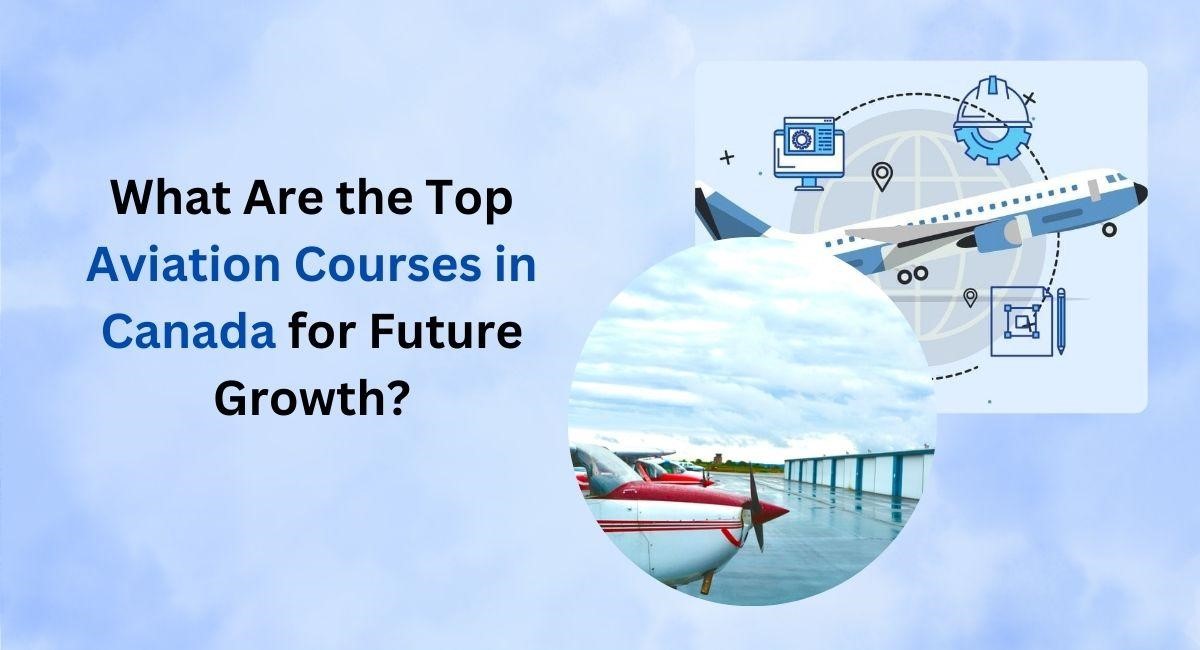Aviation industry in Canada is seeing rapid growth, offering opportunities for aspiring pilots and aviation professionals. In this comprehensive guide, we’ll explain the top aviation courses in Canada that promise future growth and career prospects.
Private Pilot Diploma
A foundational course for aspiring pilots, providing essential skills and knowledge required to operate aircraft for recreational purposes.
To enroll in this program, candidates need to meet certain requirements, including:
- Age Requirement: Most aviation schools require candidates to be at least 17 years old to pursue a Private Pilot Diploma.
- Educational Qualifications: While a high school diploma or equivalent is generally sufficient, some institutions may have specific educational requirements.
- Medical Certificate: Candidates must obtain a Class 3 Medical Certificate from an aviation medical examiner to ensure they meet the medical standards required for pilot aircraft.
- Flight Training: The program includes a specified number of flight training hours, ranging from 35 to 45 hours, where students learn essential piloting skills, navigation, and flight tricks.
Upon successful completion of the Private Pilot Diploma program, graduates can pursue various career opportunities, including:
- Recreational Pilot: Graduates can fly for personal enjoyment and leisure, exploring different destinations and experiencing the thrill of flight.
- Further Training: The private pilot diploma serves as a stepping stone for those who wish to pursue advanced pilot training and certifications, such as a commercial pilot license or an Instrument Rating.
- Flight Instruction: Some graduates may choose to become flight instructors, sharing their knowledge and expertise with aspiring pilots while gaining valuable flying experience.
Commercial Pilot Diploma
Designed for individuals seeking a career as a professional pilot, offering advanced training in flight operations, navigation, and safety protocols.
To qualify for this program, candidates need to meet specific requirements, including:
- Private Pilot License: Candidates must hold a private pilot License (PPL) or equivalent certification, demonstrating their foundational knowledge and skills in piloting aircraft.
- Flight Hours: Most institutions require candidates to have accumulated a minimum number of flight hours, usually around 200 to 250 hours, including both solo and dual flight time.
- Medical Certificate: Candidates must possess a Class 1 Medical Certificate issued by an aviation medical examiner, ensuring they meet the medical standards necessary for commercial pilots.
Upon completion of the Commercial Pilot Diploma program, graduates can pursue various career opportunities in the aviation sector, including:
- Airline Pilot: Graduates can seek employment with commercial airlines as first officers or captains, flying passengers and cargo on scheduled routes.
- Charter Pilot: Graduates may work as charter pilots, operating private or corporate aircraft for on-demand air transportation services.
- Flight Instructor: Some graduates opt to become flight instructors, providing training to aspiring pilots and gaining valuable flight experience while preparing them for their own careers in aviation.
Recreational Pilot Diploma
An ideal course for aviation enthusiasts seeking a balance between leisure flying and gaining valuable piloting experience.
To enroll in this program, candidates typically need to meet the following requirements:
- Minimum Age: Candidates must be at least 17 years old to obtain a Recreational Pilot License (RPL), which is a prerequisite for the diploma.
- Flight Training: Completion of a minimum number of flight training hours, usually around 25 to 30 hours, including both solo and dual flight time.
Airport Operation Courses
These courses focus on the management and operation of airports, covering areas such as air traffic control, airport security, and ground handling services.
To enroll in Airport Operation Courses, individuals typically need to meet the following requirements:
- Educational Qualifications: Many programs require a high school diploma or equivalent qualification.
- Language Proficiency: Proficiency in the English language is often necessary due to the international nature of airport operations.
Career opportunities in airport operations include roles such as:
- Airport Operations Manager: Overseeing day-to-day operations and ensuring compliance with safety regulations.
- Air Traffic Controller: Managing air traffic and ensuring safe takeoffs and landings.
- Airport Security Officer: Implementing security measures and protocols to safeguard passengers and airport facilities.
- Ground Services Manager: Managing ground handling services such as baggage handling and aircraft fueling.
Benefits of Aviation Courses in Canada
- Hands-on training: Aviation courses emphasize practical training, allowing students to gain real-world experience in flying and aircraft operations.
- Career advancement: Completion of aviation courses opens doors to various career opportunities in the aviation industry, including pilot positions, airport management roles, and aviation administration.
- Industry demand: With the continuous growth of the aviation sector, there is a high demand for skilled aviation professionals, making it an attractive field for aspiring individuals.
A Leading Institution in Aviation Education
As a globally recognized institution, Insignia College offers a range of aviation courses tailored to meet the industry’s demands. With state-of-the-art facilities and experienced faculty, Insignia College provides students with a comprehensive learning experience that prepares them for successful careers in the aviation field.
Conclusion
Embarking on a career in aviation through top-notch courses offered by institutions like Insignia College opens up a world of opportunities for aspiring pilots and aviation professionals. By investing in aviation education, individuals can lay a solid foundation for future growth and success in this dynamic industry.




